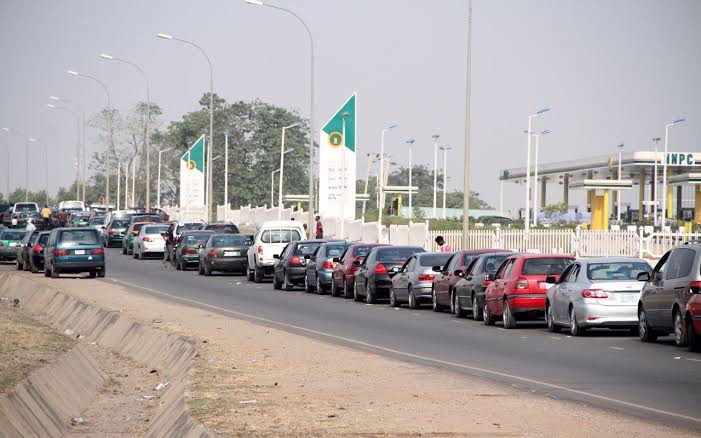Households and businesses are groaning in Nigeria’s commercial capital as a lingering petrol scarcity crisis enters its third week.
Long queues have become a familiar sight at filling stations, with many drivers spending hours waiting only to be turned away due to lack of petrol.
The shortage has impacted businesses that rely on petrol for transportation and logistics. Delivery services, taxi companies, and private transportation providers are all reporting a decline in activity.
“We’ve seen a significant drop in deliveries since the petrol shortage began,” said a spokesperson for a local delivery company. “We’ve had to adjust our routes and schedules to make the most of the limited fuel we have, but it’s still causing delays and frustration for our customers.”
“I’ve been here for two hours already,” said Jordan Abeti, a taxi driver mopping sweat from his brow. “Every station I go to, it’s the same story. Long queues, how am I supposed to make a living?”
Motorists are also feeling the pinch, with many facing long commutes to work and difficulty finding fuel for personal errands. The frustration is palpable, with reports of tempers flaring at filling stations as drivers jockey for position.
“It’s a nightmare,” Tunde Ayeni, a Lagos resident said. “I spend half my morning just trying to find petrol. It’s affecting my work and everything else.”

Findings showed many compounds in Lagos such as Ejigbo, Orile, Amuwo Odofin, lyana-Ipaja, FESTAC, Yaba and Surulere have found the hawking of petrol quite lucrative.
The situation is similar to the way smuggled fuel from Nigeria is sold in the neighbouring countries, especially Benin Republic and Togo, where hawkers display the product on the road for willing buyers.
Kevin Eze, a car owner who spoke to a correspondent in Ijegun Road, said he discovered that petrol is more available on Lagos streets than at the filling stations.
According to him, instead of queuing for a whole day at the filling station and missing all appointments, he would rather pay the black-market high price for the fuel and meet up with his scheduled activities.
He said jokingly, “As you can see, every compound now has a ‘fuel dump’ while the long queues persist at the filling stations.”
Ade Taiwo, a commercial bus driver said that most of their members would rather buy from the black market than queuing up for endless hours at the filling stations.
“Unfortunately, we cannot make any profit by buying from the streets at twice the price at filling stations. This is because there are no passengers to pay for fare increases.
“They would rather trek several kilometres to their destinations than pay the higher fares.”
The Nigerian National Petroleum Company (NNPC) Limited on Tuesday called on motorists to shun panic buying of premium motor spirit (PMS), popularly known as petrol, for the second time in two weeks due to the ongoing nationwide fuel scarcity.
In a statement released on X (formerly Twitter) and signed by Olufemi Soneye, chief corporate communications officer of the company, the NNPC said that nationwide supply and distribution of petrol has continued to improve.
The state-owned oil company cited that in filling stations monitored across several states, including Lagos and the FCT, the queues have since thinned out, “a development that will keep improving daily in other States.”
“The Company wishes to state that at the moment, it has over 1.5 billion litres of stock of PMS, which is equivalent to over 30 days of sufficiency.
“The NNPC Ltd. is also collaborating with relevant downstream agencies, such as the Nigerian Midstream & Downstream Petroleum Regulatory Authority (NMDPRA), labour unions in the sector, and security operatives, to address hoarding and other unwholesome practices,” the statement read.
The NNPC first urged Nigerians to avoid panic buying on April 25, stating that available products are sufficient in the country.
According to the state-owned oil company, tightness in the supply of PMS currently being experienced in some areas across the country is a result of logistics issues and they have been resolved.
“It also wishes to reiterate that the prices of petroleum products are not changing,” NNPC said in an earlier statement.
Olaitan Ibrahim